Considerable discussion ensued upon the claims for the votes made by Mrs Kett in respect of the billiard-room in connection with the Royal Hotel; and Mrs W. Willis for the store adjoining the Albion Hotel in Murphy-street. The Mayor said that he did not consider any married woman not having separate property in her own right, and who was living with her husband, had a right to be on the roll.
Astoundingly, the illustrious members of the Borough Council assumed that once placed on the electoral roll, a woman lost all independent thought (if she had any in the first place), and would merely have been doing the bidding of her husband when voting. Minors were also assumed to be something like the dummy bidders that squatters used, and to be doing the bidding of their father. In some cases it is clear that the mother was assisting or encouraging her young adults to enrol. Her motivations for doing so remain elusive. She may have been asking for her children to vote the way she did, but we cannot rule out that some of the older educated minors (e.g. 16 to 20 year olds) had opinions and aspirations of their own. No matter the motivations, these events indicate the agency of women in a male domain.
Increasing the number of votes this way was, he thought, never contemplated by its framers. Cr Powell said the effect of allowing the claims would be between a husband and his wife to get five votes. This, he considered, not to be the meaning of the act. He would move that the names of all married women who were living with their husbands, and not holding property in their own right, be taken off the roll, also that all names be struck off the roll where the persons were under twenty-one years of age. This motion was seconded by Councillor Wilson and carried. The court then adjourned until Tuesday at 11 a.m., when it again met. Present : — The Mayor (in the chair), and Crs Thomas, Sharland, Powell, Grant and Wilson.
The names of the married women not entitled to vote were then struck off the roll, also those under the age of 21 years. The married women struck off were Mrs Kett, Mrs Brew, Mrs Issett, Mrs Mary Ann McCormick, Mrs Molony, Mrs Margaret Norton, Janet Powell, (now Mrs Wright), Mrs Spearing, Mrs Mary Sarah Thomas, Mrs Margaret Tone, Mrs Weidt, and Mrs Willis. Those struck off for being under 21 years of age were Geo. F. Brew, Catherine A. Lacy, Sophia Millard, Ann Chandler, A. Lacy, Sophia Millard, William Grant, Mary Angela Lacy, William Martin Lacy, John A. Murdoch, Henry Alexander Murdoch, William S. Murdoch, W. H. Norton, and Alex. Tone, junr.
Below is a list of the women and minors mentioned and some details about them. I regret that many have so little information available about them that they can only be described in terms of “wife of…”.
Mary Ann Brew, formerly Leacy, nee Dodd
Brew, Mrs: Mary Anne (nee Dodd, formerly Leacy aka Lacy) Mary Ann supported herself as a shopkeeper after the death of her first husband Michael Leacy in 1863. She married George Brew in 1865 and at different times after this marriage was the licensee of the Clare Hotel and the owner of a flour mill.
Brew, Geo. F. – George Francis Brew was the nine year old son of Mary Anne Dodd and George Brew. This seems to be a case of trying to gain extra votes but by whose hand? And for what purpose?
Chandler, Ann- (under 21). A large family of Chandlers settled in the area. Most went to Rutherglen and became vignerons, with only Charles and his wife Anna (nee Ellis) remaining in Wangaratta. Anna was too old to be the person mentioned and their daughter Anne Farmer Chandler was 26 years old in 1875 and had married Owen Evans in 1872. Had she been on the roll for several years as a young unmarried woman and the council had only just got around to dealing with this issue? Or was there another Ann Chandler?
Grant, William, born in 1860, the first son to Scottish born John Grant & Jessie Urquhart. John was a builder and timber merchant, and a member of the Wangaratta Lodge of St John. Fifteen year old William was possibly following in his father’s footsteps and beginning to understand his role in society and the benefits afforded to him as a wealthy European male.
Issett, Mrs: Anne (aka Izzett, nee White), was married to successful butcher David Issett but the couple had no children. Anne’s obituary described her as “a generous subscriber to a number of bodies”, including Holy Trinity Cathedral and the Red Cross. Her independence and movement in these higher echelons of female society probably empowered her to attempt to have an electoral based say in her community. But that wasn’t Anne’s only reason for wanting to vote. In 1875 she appeared to be running her husband’s business, or at least doing the accounts for him. In this year she took my relative Emily Jane Willett (nee Clark) to court over the unpaid debt of Emily’s late husband James.
Kett, Catherine Sarah (billiard room): (nee Green), wife of Henry Kett, butcher and publican, Catherine held the license for the Albion Hotel in Murphy Street in 1882 while her husband was still alive, so was an independant businesswoman in her own right. Catherine is mentioned on the family grave in Wangaratta Cemetery but she is not buried there. After the death of Henry in 1882 she remarried Robert Cawsey and moved to Kyneton.
Lacy, A. This is probably a transcription error by the newspaper. Mary Anne Brew, the mother of the Lacy/Leacy children had no other Leacy children to place on the roll – see below.
Lacy, Catherine Anne (cottage): the fifteen year old daughter, and third child, of Mary Anne Brew. It is not known if she owned any property, though rate books may shed more light on this.
Lacy, Mary Angela: Mary Anne Brew’s oldest child, still only 19 years old.
Lacy, William Martin; Mary Anne Dodd’s 17 year old son. In December 1880 at the age of 23 he was granted the license of the Clare Hotel, which was transferred to his mother Mary Anne in 1882. It seems that Mary Anne was adept at navigating the male dominated business systems.
McCormick, Mary Ann (nee Gill) was the daughter of Irish parents. Her father James Gill was mostly a farmer but did turn his hand to being a publican before his untimely death in 1873. Mary Ann’s illiterate mother Bridget Gill was bequeathed land that was held in trust for Mary Ann and her mother. Mary Ann also owned three allotments of land in Wangaratta North in her own right, including the property that she lived in with her second husband David Patrick McCormick whom she married in 1875. Mary Ann was also only 19 years old in 1875 so was unlikely to pass any test set by the council members.
Millard, Sophia (house): Nineteen year old daughter and only surviving child of Thomas Millard, who was variously a publican, storekeeper and bootmaker. Millard was a contemporary of William Henry Clark. The year after this electoral stoush, Sophia applied for, and was granted a lease for 191 acres in the parish of Glenrowan.
Molony, Mrs was probably Hanorah/Norah (nee Cahir). She was the 26 year old wife of Michael, a former brewery owner.
Murdoch, John A. This MAY be John Murdoch. oldest surviving son of William St Fort Murdoch, successful businessman and owner of the Commercial Hotel in Murphy Street. John would have been 17 years old.
Norton, Margaret (nee Maroney), Irish born wife of Samuel Norton, variously a billiard room proprietor, vine grower, and Town Clerk. Margaret was a busy mother of nine, one of whom had died only two months before this decision.
Norton, W H (aged under 21) – it seems likely that this was William Henry, a son of Margaret and Samuel Norton. William would only have been 11 years old so there was some manipulating of electoral rolls going on.
Powell, Janet: Widow of George Powell, bootmaker, who died in 1868 leaving Janet with next to nothing in assets. Janet (nee Drover) had remarried John Wright in 1874. She had survived seven years as a widow, raising five young children, possibly with the assistance of her married sister Isabella. The use of her surname from her first marriage suggests that she had been on the voting roll for at least a year.
Spearing, Mrs (Bessie nee Taylor): wife of James Henri Brougham Spearing, brewery owner, publican, Councillor, committee member of many community organisations. With the status of her husband, Bessie would have been moving in many social circles and probably involved in committees then considered the domain of women, such as charities. Perhaps this experience led Bessie to want more say in her local community.
Thomas, Mrs Mary Sarah (nee Hughes): Sarah was married to John Hampden Thomas who was on the committee of the Wangaratta Building Society and a member of the Wangaratta Lodge of St John. Like many other women on this list, Mary’s social status and movement would have meant that she was more comfortable in asserting herself.
Tone, Mrs Margaret (nee Canny), wife of Alexander, was the mother of six surviving children by 1875 and yet she was also a tireless charity worker in her own right.. Her marriage to a successful businessman probably allowed her to have this role outside the home, and gave her the opportunity to see what could be done if only she could influence politics. Margaret’s obituary stated that she “was a most active worker in the cause of charity, and was often away from home a week at a time collecting in aid of a movement which is for the benefit of humanity.
Tone, Alex jnr, the 19 year old son of Margaret and Alexander Tone.
Weidt, Mrs (nee Anna Maria Stonelake), wife of Albert Franz Christian Weidt, (sometimes known as White), who was a brickmaker turned publican in 1875. Anna Maria had her own colourful history which can be read here.She was no shrinking violet and was clearly happiest when in charge of her own life.
Willis, Maria L: Maria Louisa (nee Purtill) said she was entitled to vote based on her ownership of a store adjoining the Albion Hotel on Murphy St. Maria was the wife of William (a saddler and previous Borough Mayor) who held the license for the Albion Hotel which was run in the back two rooms of a shop, so it seems likely that her claim was genuine. Between 1877 and 1880 Maria held the license of the Albion Hotel herself. Many women were publicans, either in their own right, or because their husbands were unfit or debarred from holding a license. Yet their gender, combined with a connection to a male, prevented them from having a right to vote.

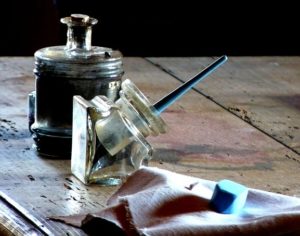
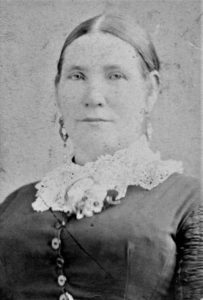
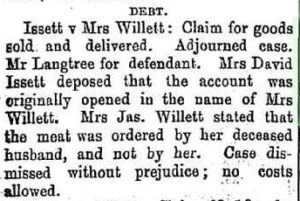
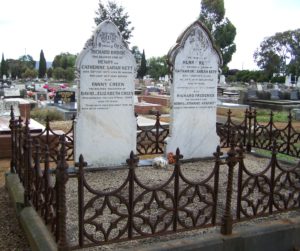
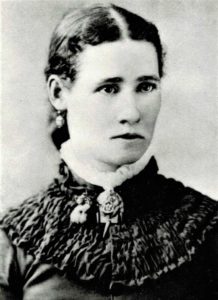




This is a great story, not least because it clearly reveals that women *were* interested in political issues and trying to push their way into public spheres. They put themselves up for election to schools Boards of Advice, became probation officers, and were leading lights in charitable organisations such as Benevolent Societies. They signed petitions and formed delegations. Men could only use the imposition of laws and rules to protect their frail egos.
Thanks Lenore. I will be keeping an eye out for other women in the types of roles you mention. It is amazing that women (even those without a male to tell them what to do!) were deemed competent to manage major businesses such as hotels.